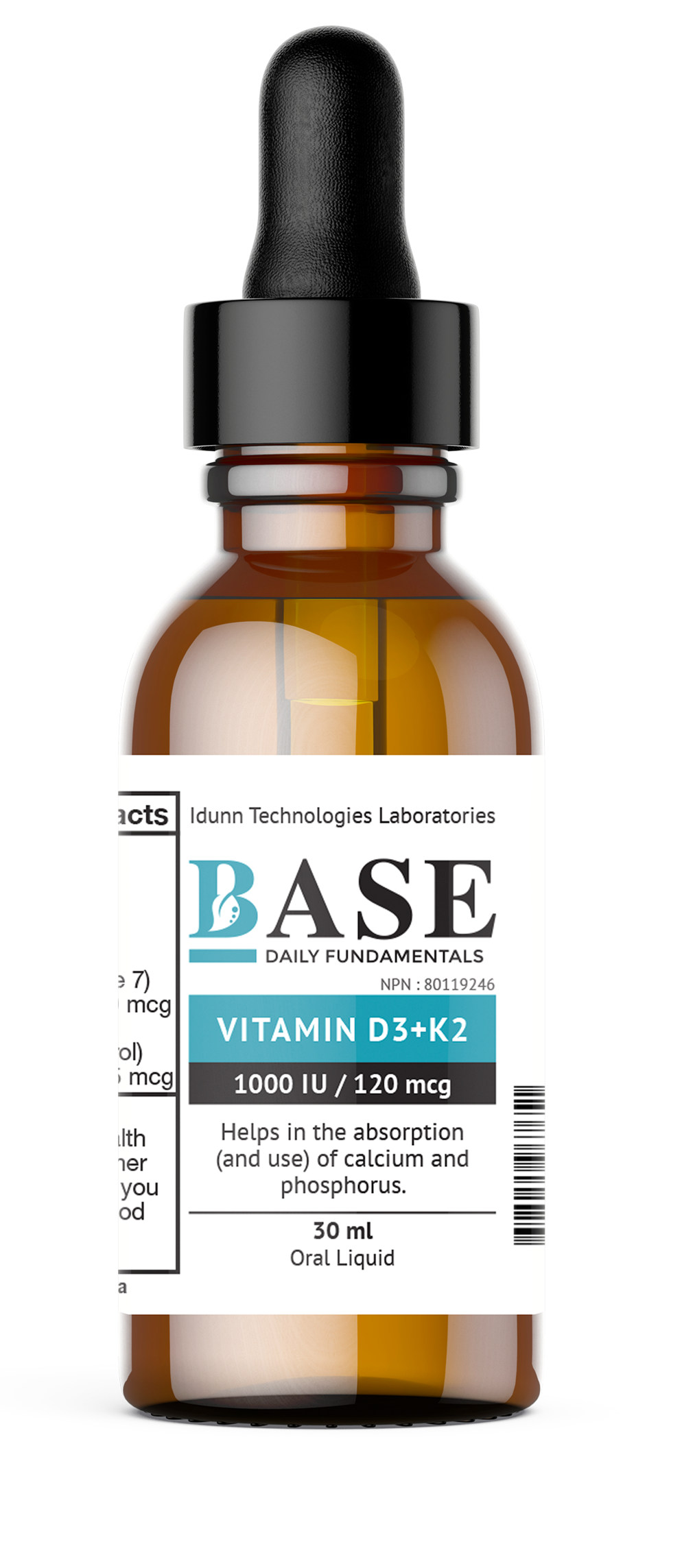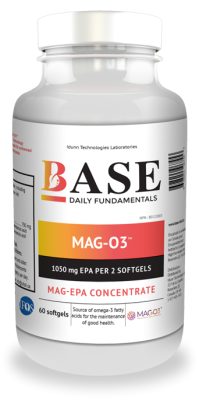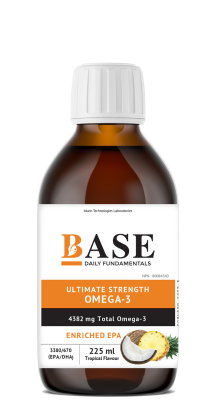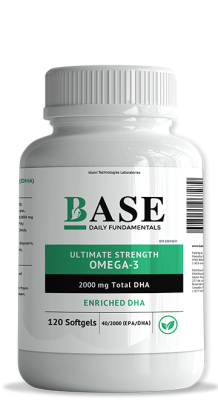Vitamin D3 + K2
Helps with the absorption (and utilization) of calcium and phosphorus.

Medicinal ingredients (each drop):
Vitamin K2
(Menaquinone 7)…………30 mcg
Vitamin D
(Cholecalciferol)………..6.25 mcg (250 UI)
Non-medicinal ingredients:
Medium chain triglycerides,
Mixed Tocopherols concentrate.
Mode d’emploi :
Adults 19 years and older:
Take 4 drops 1 time per day.
Adolescents 9-18 years:
Take 2 drops 1 time per day.
Children 1-8 years:
Take 1 drop 1 time per day.
Vitamin D3 is well known for its benefits on bone density and calcium metabolism in general, but its roles in the body are much more extensive. It plays a crucial role in immune system function, as well as in important functions for muscle cells, brain function, and cell differentiation (Afshan et al., 2021).
Vitamin K2 plays a significant role in bone health and cardiovascular health. Although vitamin K2 is not widely recognized as a common deficiency in the general population, it also carries no associated risk. Health Canada has not established a Tolerable Upper Intake Level (the level above which adverse effects might occur). Therefore, higher intakes of vitamin K2 can provide valuable benefits, particularly for bone and cardiovascular health, and its toxicity is considered to be nonexistent (Schwalfenberg GK, 2017).
Osteocalcin is a protein that primarily transports calcium from the intestines to the bones, where it helps with calcium fixation (contributing to bone density). Vitamin D is necessary for its synthesis, and vitamin K2 is required for its activation. Additionally, activated osteocalcin helps decalcify soft tissues (such as arteries) that should not be calcified.
Vitamin K2 is therefore recommended for osteoporosis and to reduce arterial calcification (Schwalfenberg GK, 2017). For this reason, in cases of reduced bone density or a diagnosis of osteoporosis, it’s best not to take any chances and to take BASE Vitamin D3 + K2.
The benefits of vitamin D3 on immune system function are numerous and complex. It triggers a cascade of events involving both innate and adaptive immunity, including increased antimicrobial secretions, production of antiviral proteins, activation of killer cells, creation and release of antibodies, modulation of the inflammatory response (not too much, not too little), and repair of damaged tissues (Harrison et al., 2020).
As for vitamin K2, it blocks an inflammatory cascade by inhibiting a key mediator, NF-kB (Nuclear Factor Kappa B; Li et al., 2017).
BASE liquid Vitamin D3 + K2 allows you to easily adjust your daily or weekly intake.
Deficiencies in these two vitamins are associated with an increased risk of diabetes, cardiovascular disease, and cancer (Kidd PM, 2010; Xv F, Chen J, Duan L, Li S, 2018). While the exact mechanisms are not entirely clear, the fact that both deficiencies are linked to the same diseases makes simultaneous supplementation a logical choice.
BASE Vitamin D3 + K2 allows you to take both vitamins together, offering synergistic effects to support your overall health.
Benefits
Vitamin D3 is well known for its benefits on bone density and calcium metabolism in general, but its roles in the body are much more extensive. It plays a crucial role in immune system function, as well as in important functions for muscle cells, brain function, and cell differentiation (Afshan et al., 2021).
Vitamin K2 plays a significant role in bone health and cardiovascular health. Although vitamin K2 is not widely recognized as a common deficiency in the general population, it also carries no associated risk. Health Canada has not established a Tolerable Upper Intake Level (the level above which adverse effects might occur). Therefore, higher intakes of vitamin K2 can provide valuable benefits, particularly for bone and cardiovascular health, and its toxicity is considered to be nonexistent (Schwalfenberg GK, 2017).
Osteocalcin
Osteocalcin is a protein that primarily transports calcium from the intestines to the bones, where it helps with calcium fixation (contributing to bone density). Vitamin D is necessary for its synthesis, and vitamin K2 is required for its activation. Additionally, activated osteocalcin helps decalcify soft tissues (such as arteries) that should not be calcified.
Vitamin K2 is therefore recommended for osteoporosis and to reduce arterial calcification (Schwalfenberg GK, 2017). For this reason, in cases of reduced bone density or a diagnosis of osteoporosis, it’s best not to take any chances and to take BASE Vitamin D3 + K2.
Inflammation
The benefits of vitamin D3 on immune system function are numerous and complex. It triggers a cascade of events involving both innate and adaptive immunity, including increased antimicrobial secretions, production of antiviral proteins, activation of killer cells, creation and release of antibodies, modulation of the inflammatory response (not too much, not too little), and repair of damaged tissues (Harrison et al., 2020).
As for vitamin K2, it blocks an inflammatory cascade by inhibiting a key mediator, NF-kB (Nuclear Factor Kappa B; Li et al., 2017).
BASE liquid Vitamin D3 + K2 allows you to easily adjust your daily or weekly intake.
Synergy
Deficiencies in these two vitamins are associated with an increased risk of diabetes, cardiovascular disease, and cancer (Kidd PM, 2010; Xv F, Chen J, Duan L, Li S, 2018). While the exact mechanisms are not entirely clear, the fact that both deficiencies are linked to the same diseases makes simultaneous supplementation a logical choice.
BASE Vitamin D3 + K2 allows you to take both vitamins together, offering synergistic effects to support your overall health.





